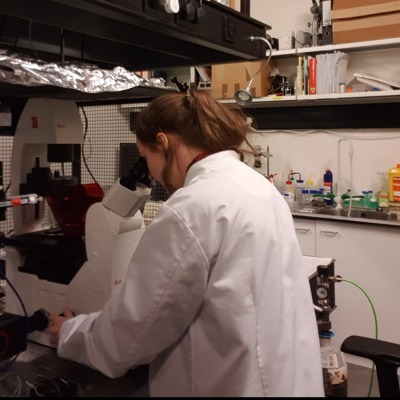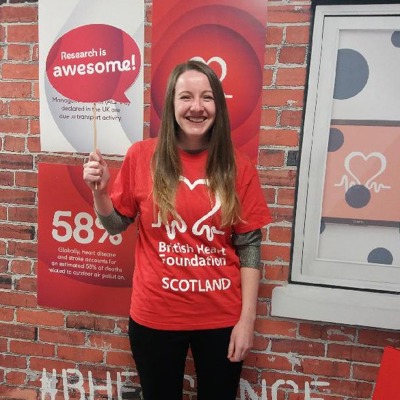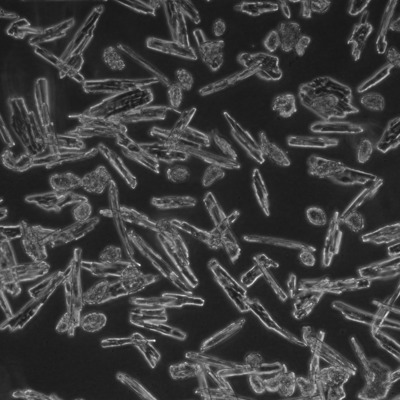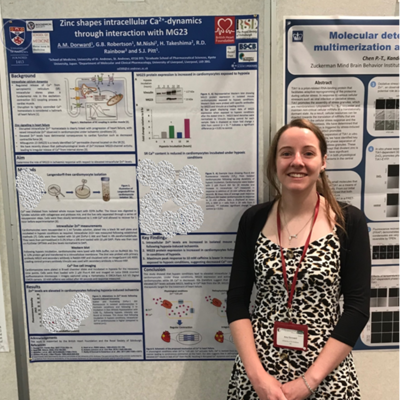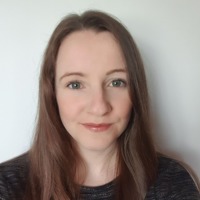
Amy Dorward
Research Fellow at University of St Andrews
Don't ever let anyone tell you what you can't do. People have told me so many times "but you can't do that"...so far they've all been wrong.
About Amy...
Who am I?
"As a research scientist I think my personality types match well with my job. All of the personality types include qualities such as being polite, compassionate and trustworthy. I have worked with people in my research group and from around the world, so these are all important when working with others.I am responsible for my own project and am part of a research group where we work together to answer bigger questions which fits very well with being an influencer. My research is charity funded, so I do lots of public outreach which means I have to be able to explain my research to non-scientists. I also have to be good at finding information on my topic of research and have leadership qualities when managing others in the group, such as new research students. When carrying out experiments I must be thorough to make sure I haven't forgotten anything.When reviewing data from my experiments I must be careful with details and honest so quality controller fits well. This personality type also challenges the way things are done which I do when planning new experiments. A streak of curiosity always goes a long way in science as it's what motivates me to keep looking for new questions and I must be proactive to get my research done. It's also essential when working with chemicals which could be dangerous that I am mindful of keeping people safe. Manager also fits well with my job. I must be motivated to complete experiments when working alone and adaptable when things don't go to plan (which is very common in research especially when trying new things). I must also be open minded to what others think my data means and to other peoples ideas. I am a good organiser as I have to plan my project efficiently and work around meetings, research talks and training courses. Encouraging discussion and listening are also very important - in my research lab this is usually how we come up with new ideas or experiments to try. "
What do I do?
"I am a Research Fellow at the University of St Andrews, funded by the British Heart Foundation (BHF). I spend 3 years in the lab doing research and carrying out experiments - after that I have maximum of a year to write up all my findings which is submitted as a thesis. I just finished my PhD in 2021, so can now call myself Dr instead of Ms. My research is looking at what causes heart failure. Heart failure is a condition where your heart can't pump blood around your body properly. This usually happens after your heart has been damaged like after a heart attack. Your heart beats because calcium moves in heart cells in a very specific way, just like how a busy road junction needs traffic lights to keep everything moving smoothly. If the traffic lights go off, car crashes can happen which causes chaos. This can also happen in the heart - if calcium doesn't move properly, parts of the heart beat when they are not supposed to and heart cells die, so the heart can't work properly. I am researching why calcium doesn't move properly after damage - so what causes the traffic lights to go off. Your heart cannot heal (like your skin can), so I hope my research will eventually lead to a new treatment for heart failure.I really enjoy my job. I am still learning new things and every day is different. As a research scientist, I am looking at things that no one has ever looked at before and researching new ideas which is very exciting. I also get to work with lots of different people and travel all over the world - during my PhD I have worked in a laboratory in University of Leicester (UK) and Kyoto University (Japan). The starting salary for a Research Fellow is around 30k. "
How did I get here?
"My route to my current role has been quite \"standard\" for a Research Fellow. When I was at school I didn't know what I wanted to do for a career. I really enjoyed biology and learning about how the body works, and I was good at the subject, so I decided to do BSc(Hons) Anatomy and Physiology at University of Dundee (anatomy is where things are and physiology is how it works).While I was at university, a new masters course was started. Instead of graduating after 4 years with a BSc(Hons) degree I graduated after 5 years with a masters (MSci). I was very lucky being a Scottish student that I didn't have to pay any tuition fees to do my degree. I also had a part time job in a cafe which meant I didn't have any student debt. While at university I did general science classes which become more specialised and more detailed as the years went by.In 4th year I had a heart and circulation module which was so interesting (scientists still don't know what starts your heart beating!) through which I met the lab principal investigator (what we call the boss of a research group) who went on to be my 5th year masters project supervisor. My masters project was based in heart research and I spent 6 months working on my own lab project. The project was new research and very exciting, I learned lots of new skills both in the lab and also personal skills like planning and organising my project. When I was almost finishing my degree I was hoping to find a job in a science lab but I didn't think I was smart enough to a PhD - I'd had teachers at school who told me I'd never be a doctor which made me work harder at my degree, but I was very unsure. I was so lucky to have a very supportive supervisor who encouraged me to apply for PhD positions. After a few unsuccessful applications I was offered a PhD position at the University of St Andrews.I carried out my PhD from 2017-2021. During this time I was a full time researcher and I managed my own experiments and trained other students in the lab. At the end of my research I had to write up all my data in a thesis and do a viva where I was asked about my research by leaders in the field - a bit like an interview. My PhD data was very exciting, so my supervisor wrote a grant for me to continue the research when I finished my PhD. We were lucky and were given this money, so I am now a Research Fellow. I have been inspired along my route by a number of scientists, not famous scientists, but the ones who I have worked with at University of Dundee and University of St Andrews, especially my PhD supervisor. These are kind, compassionate people with a passion for what they do. They are people with backgrounds much the same as mine that are on the cutting edge of research and have contributed amazing things to science, so make me feel like I could contribute to science too. "
The life I live
"In my spare time I like to read science fiction and fantasy/adventure books that take me to a whole other world different from my own. I also like to keep fit, and have fun going to the gym, swimming and exercise classes with my best friend. I enjoy going hill walking on weekends (if the weather is nice!) and also play darts once a week. Life as a researcher can be busy sometimes, but I still make time to visit friends from university and from my old part time job which takes me to cities all over the UK. "
My typical day
"In my typical day I do experiments in the lab. For my project researching how heart failure happens, I look at the calcium in mouse heart cells, especially after the cells have been damaged. I do this by tagging the calcium so it glows (like a barcode in the supermarket) and use a microscope to see the cells with a special coloured light. I also look at different proteins in cells (if a protein is changed after the cell is damaged, it may be the cause of the damage) using lots of different techniques. One of these is called Western blot, where a sample of cells or heart tissue is mushed up and all the proteins separated. I then transfer the proteins onto a specific type of paper (like how you transfer a temporary tattoo onto your skin) and after adding lots of different chemicals to the paper I use a special camera to take photos of the proteins which I can see on a computer. When I am not in the lab I am reading scientific papers and keeping up with new research in my field. I also analyse my data on my computer, go to courses to learn new skills and go to talks/seminars held in my department (School of Medicine) and in other university departments (Schools of Biology and Chemistry). In my lab group we also have lab meetings where we discuss results and talk about new research from other groups. "
My qualifications
"5th year of high school:Higher biology - A, higher chemistry - A, higher mathematics - A, higher English - B, higher geography - B.6th year of high school:Advanced higher biology - A, Scottish Baccalaureate in Science - B, advanced higher chemistry - C, advanced higher mathematics - D MSci Physiological Science - 1st classPhDIn my current role I use my qualifications in biology, chemistry, maths and skills from my Scottish Baccalaureate in Science. I also now do physics which is a class I never did in school. "
Amy's Photos
